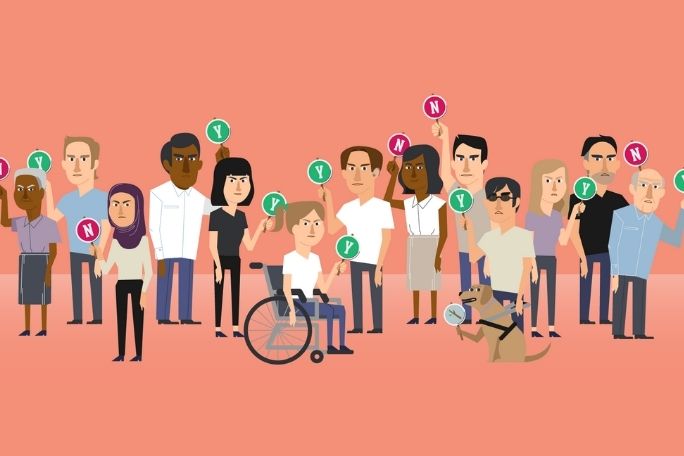Lesson summary
In this Finding Out lesson, students will watch a video introduction of the concept of democracy, then use the ‘See-Think-Wonder’ visible thinking routine to review their understanding. They will work in pairs to dig deeper into what they are wondering about through an online research task. Students will then learn about the rule of law and what happens without the rule of law in a jigsaw classroom investigation. Students will connect the concepts explored in the lesson by listing three ways that the rule of law protects the democratic rights and freedoms that we enjoy in Australia, and reflect on their understanding in a pyramid of reflection.
Essential questions:
- What are the features of a democratic society?
- What is the rule of law?
- What happens if there is no rule of law?
- How do democracy and the rule of law ensure that we enjoy rights and freedoms?
Lesson guides and printables
Lesson details
Curriculum mapping
Australian Curriculum content descriptions:
Year 8 Civics and Citizenship:
- The freedoms that enable active participation in Australia’s democracy within the bounds of law, including freedom of speech, association, assembly, religion and movement (ACHCK061)
- How citizens can participate in Australia’s democracy, including use of the electoral system, contact with their elected representatives, use of lobby groups, and direct action (ACHCK062)
- Critically analyse information and ideas from a range of sources in relation to civics and citizenship topics and issues (ACHCS070)
- Reflect on their role as a citizen in Australia’s democracy (ACHCS074)
General capabilities: Literacy, Critical and Creative Thinking, Personal and Social Capability, Ethical Understanding.
Relevant parts of year 8 achievement standards: Students analyse features of Australian democracy, and explain features of Australia’s democracy that enable active participation. When researching, students develop a range of questions to investigate Australia’s political and legal systems and critically analyse information gathered from different sources for relevance. They explain different points of view on civics and citizenship issues. Students develop and present reasoned arguments on civics and citizenship issues using appropriate texts, subject-specific language and concepts.
Unit of work: Story of Our Rights and Freedoms – Year 8.
Time required: 120 mins.
Level of teacher scaffolding: Medium – teacher to lead students through multiple interactive activities.
Resources required
- Student Worksheet – one copy per student
- Device capable of audio/visual presentation to present a website to the class
- Sticky notes
- Butcher’s paper (optional)
- Democracy – factsheet
- Device capable of accessing an online webpage (one per student)
- Reflection Pyramid Printout (optional – also available on the Student Worksheet)
Skills
This lesson is designed to build students’ competencies in the following skills:
- Collaboration
- Social skills
- Communication
Additional info
Throughout the Story of Our Rights and Freedoms lessons, students will consider Civics and Citizenship concepts through a human rights lens. They will critically assess the Australian system of government and the effect that it has on our rights and freedoms.
There is no universally accepted definition of human rights, and our understanding is continually developing. Some definitions include:
- The recognition and respect of peoples’ dignity
- A set of moral and legal guidelines that promote and protect the recognition of our values, our identity and access to an adequate standard of living
- The basic standards by which we can identify and measure inequality and fairness
- Those rights associated with the Universal Declaration of Human Rights (UDHR)
When we talk about human rights we usually refer to principles that have been agreed upon by countries throughout the world. These rights have been set down in international agreements and form part of international law. They can also be written into the domestic law of individual countries. Human rights cover virtually every area of human life and activity. These include:
- Civil and political rights, such as freedom of speech and freedom from torture
- Economic and social rights, such as the rights to health and education
- Individual rights, including the right to a fair trial
- Collective rights, or those rights that apply to groups of people, such as the right to a healthy environment or to live on one’s ancestral land.
The UDHR is an international document that recognises the basic rights and fundamental freedoms to which all human beings are entitled. It was adopted by the United Nations General Assembly on 10 December 1948 and marks a key milestone in the history of human rights. The Magna Carta, though limited in who it protected, was an important precursor to the UDHR.
Click here to watch a video about the Magna Carta.
You can view the entire text of the Universal Declaration of Human Rights, and the other core international human rights treaties, on the United Nation’s website or by downloading RightsApp (free from the iTunes App store).


Welcome back!
Don't have an account yet?
Log in with:
By signing up to Cool.org you consent and agree to Cool's privacy policy to
store, manage and process your personal information. To read more, please see
our privacy policy here(Opens in new tab).
Create your free Cool.org account.
Many of our resources are free, with an option to upgrade to Cool+ for premium content.
Already have an account?
Sign up with:
By signing up to Cool.org you consent and agree to Cool's privacy policy to
store, manage and process your personal information. To read more, please see
our privacy policy here(Opens in new tab).